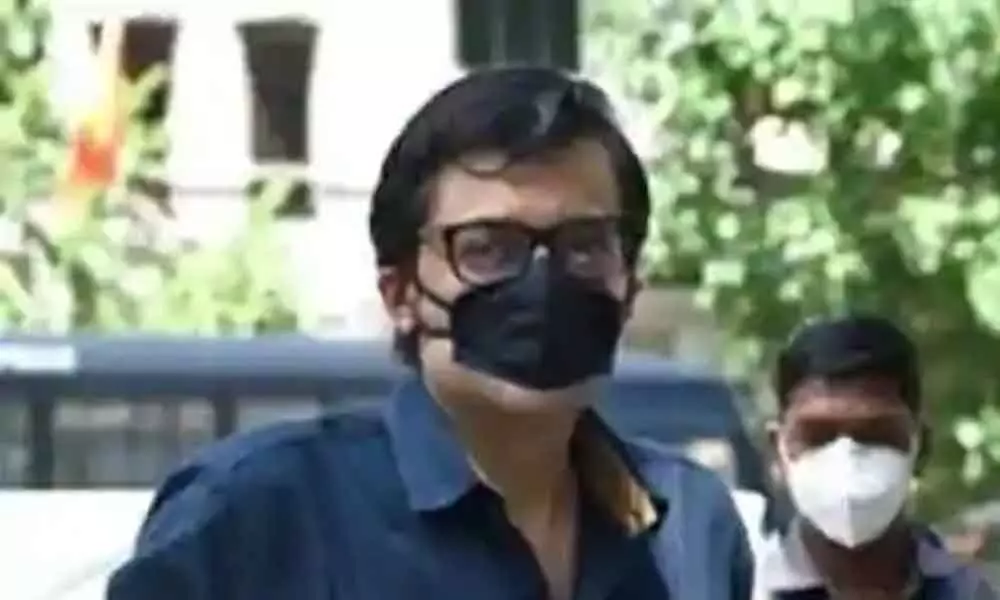Live
- Be part of transforming India into Viksit Bharat: Kishan Reddy
- Now, tackle pest menace in hostels with LED lights
- Hyderabad: Students protest over appointing Physics prof as EdCET convener
- Young doctors urged to work for healthy community
- Bhavani Deeksha Viramana continues
- Sridhar Babu hardsells key sectors to Malayasia
- Health Min Damodar Raja Narsimha holds meet to improve infra in govt hosps
- Inter exam fee last date extended
- Outrage as stray dogs poisoned in Sullurpeta
- Hyderabad soaks in vibrant Yuletide spirit
Just In
Prima Facie Evaluation Of FIR Against Arnab Goswami Doesn't Establish Abetment Charge: Supreme Court


Arnab Goswami
Prima facie evaluation of the FIR lodged by the Maharashtra Police against Republic TV editor-in-chief Arnab Goswami does not establish any abetment to suicide charge, the Supreme Court said on Saturday
New Delhi: Prima facie evaluation of the FIR lodged by the Maharashtra Police against Republic TV editor-in-chief Arnab Goswami does not establish any abetment to suicide charge, the Supreme Court said on Saturday giving a detailed reason for granting interim bail to Gowswami on November 11 in the abetment to suicide case.
A bench of the apex court, headed by Justice DY Chandrachud, said the Bombay High Court failed to take a prima facie view of the FIR, the nature of accusation and the level of the charge against Goswami and erred in not granting bail.
The Bombay High Court abdicated its duty in protecting the liberties of a citizen who had been complaining that he was being targeted by the Maharashtra government for his unplayable views expressed in his TV channel, Justice Chandrachud said.
He said the High Court abdicated its role as a protector of constitutional values and fundamental rights, and added that criminal law should not become a tool for selective harassment for citizens.
The bench noted that doors of the courts cannot be closed in such cases and courts should remain open for all cases of deprivation of personal liberty and such deprivation cannot even be for one day. Access to Justice needs to be democratised and it cannot be a selective tool for a few, it said.
Justice Chandrachud said it needs to be seen whether the accused can tamper evidence, or whether the accused can flee, or whether the ingredients of offence is made out along with interests of the state. Here the case is about the liberty of a citizen, he noted.
"The High Court, in other words, failed to apply its mind to a fundamental issue that needed to be considered while dealing with a petition for quashing under Article 226 of the Constitution or Section 482 of the CrPC," the bench said in its order.
The bench noted that the FIR recites that the spouse of the informant had a company carrying on the business of architecture, interior design and engineering consultancy.
"According to the informant, her husband was over the previous two years -- having pressure as he did not receive the money of work carried out by him. The FIR recites that the deceased had called at the office of the appellant and spoken to his accountant for the payment of money," the order said.
"Apart from the above statements, it has been stated that the deceased left behind a suicide note stating that his -- money is stuck and following owners of respective companies are not paying our legitimate dues. Prima facie, on the application of the test which has been laid down by this court in a consistent line of authority, which has been noted above, it cannot be said that the appellant was guilty of having abetted the suicide within the meaning of Section 306 of the IPC. These observations, we must note, are prima facie at this stage since the High Court is still to take up the petition for quashing," it added.
The bench said the High Court in failing to notice the contents of the FIR and to make a prima facie evaluation abdicated its role, functions and jurisdiction when seized of a petition under Section 482 of the CrPC. It said the High Court recited the legal position that the jurisdiction to quash under Section 482 has to be exercised sparingly.
"These words, however, are not meaningless incantations but have to be assessed with reference to the contents of the particular FIR before the High Court. If the High Court were to carry out a prima facie evaluation, it would have been impossible for it not to notice the disconnect between the FIR and the provisions of Section 306 of the IPC," it added.
The Supreme Court had, on November 11, granted interim bail to Arnab Goswami and two others in connection with the 2018 abetment to suicide case holding that the Bombay High Court was incorrect in not granting bail in the matter.
Goswami and two others were on November 4 arrested in connection with the 2018 suicide case. Later, they were sent to 14-day judicial custody by a lower court later that day.
The suicide case, in which a closure report was filed in 2019, was reopened after Naik's wife Akshata approached a court. In September this year, Maharashtra Home Minister Anil Deshmukh had ordered a re-investigation into the case after a fresh complaint by Naik's daughter.

© 2024 Hyderabad Media House Limited/The Hans India. All rights reserved. Powered by hocalwire.com






